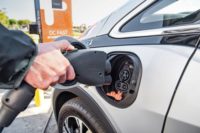WASHINGTON—Daimler Truck North America, Navistar Inc. and Volvo Group North America have formed a coalition called Powering America’s Commercial Transportation (PACT). The goal of the initiative is to promote the construction of a nationwide battery charging infrastructure for medium- and heavy-duty commercial vehicles. Other founding members of PACT include ABB E-mobility and Voltera Power.
Access to charging infrastructure in the United States is an increasingly significant bottleneck to the widespread adoption of electric trucks. Most efforts have focused on the needs of light-duty passenger vehicles, which require different type of equipment.
According to the International Council on Clean Transportation, nearly 600,000 chargers will be needed nationwide to accommodate the 1.1 million Class 4-8 battery-powered trucks anticipated to be deployed by 2030, which will consume 140,000 megawatt hours of electricity every day.
"Decarbonizing the commercial transportation sector…is critical to meeting our nation’s climate goals,” says John O'Leary, president and CEO of Daimler Truck North America. “But, the transition to zero-emission vehicles is stalling without the deployment of the needed charging infrastructure.”
"Commercial vehicle customers require fast, reliable, affordable, and convenient power to effectively deploy [zero emission] fleets at scale," adds Mathias Carlbaum, president and CEO of Navistar. “To enable their success, we must work collaboratively across sectors to deliver an infrastructure that provides access to seamless electricity and meets the commercial transportation industry’s unique needs.”
"The scale of infrastructure required for medium- and heavy-duty EV adoption is unprecedented,” notes Stephen Roy, chairman of Volvo Group North America and president of Mack Trucks. “Understanding and coordination across the different stakeholders is imperative to deploy chargers quickly and cost-effectively. PACT will promote best practices to streamline this complex transition while minimizing impacts on fleets, utilities and the economy.”




